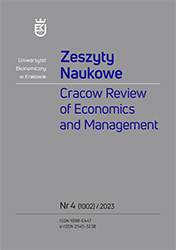Challenges in Contemporary HRM – An Analysis of Polish-Language Online Offers of Consulting Firms
DOI:
https://doi.org/10.15678/ZNUEK.2023.1002.0408Keywords:
Human Resources Management (HRM), theory-practice gap, consulting, cognitive and methodological challengesAbstract
Objective: To identify the challenges theorists of HRM face. Such challenges are hidden in the content of HRM consulting firm offers.
Research Design & Methods: The analysis of the content of online offers of Polish consulting firms was based on general guidelines for qualitative research formulated by Saldana (2011), Charmaz (2009), and Silverman (2007).
Findings: The analysis of the content of the offers revealed five categories and four dimensions considered by consultants to be of key importance to practitioners. These results organise and extend HRM issues in an original way.
Implications / Recommendations: The synthesis of the categories and dimensions identified points to three topics that are emerging as a challenge for the “new normal” in HRM: 1) naturalisation of the language used in HRM, 2) the hidden logic of the improvement process and its consequences, 3) cognitive challenges that go beyond the concept of the simple mechanism of adapting theory to practice.
Contribution: The research results contribute to the knowledge base on key challenges consultants see for improving HRM. The categories and dimensions of HRM improvement uncovered in the study differ from those discussed in other studies. Two new challenges for practitioners and researchers have emerged. The first concerns how to go about improving methods of analysing organisations and their management. In this respect, kaleidoscope-like thinking is recommended. Such an approach differs from thinking based on multidimensionality, complexity, and interdisciplinarity. The second challenge concerns improving theoretical knowledge by considering the practice of consulting companies working on the market. These issues have not been sufficiently described in the literature.
Downloads
References
Bellaaj M. (2014), Gestion de la relation client et internet: Les impératifs stratégiques pour la mise en place d’un projet e-GRC par les PME, „Revue Française De Gestion”, vol. 238. DOI: https://doi.org/10.3166/rfg.238.119-137
Boon C., Den Hartog D.N., Lepak D.P. (2019), A Systematic Review of Human Resource Management Systems and Their Measurement, „Journal of Management”, vol. 45(6), https://doi.org/10.1177/0149206318818718. DOI: https://doi.org/10.1177/0149206318818718
Bouwmeester O., Heusinkveld S., Tjemkes B. (2021), Intermediaries in the Relevance-gap Debate: A Systematic Review of Consulting Roles, „International Journal of Management Reviews”, June, https://doi.org/10.1111/ijmr.12267. DOI: https://doi.org/10.1111/ijmr.12267
Charmaz K. (2009), Teoria ugruntowana. Praktyczny przewodnik po analizie jakościowej, Wydawnictwo Naukowe PWN, Warszawa.
Crișan E.L., Marincean A. (2023), The Digital Transformation of Management Consulting Companies: A Review, „Information Systems and e-Business Management”, https://doi.org/10.1007/s10257-023-00624-4. DOI: https://doi.org/10.1007/s10257-023-00624-4
Dictionary.com (2022), https://www.dictionary.com/browse/new-normal (data dostępu: 17.11.2022).
Feldman M., Worline M. (2016), The Practicality of Practice Theory, „Academy of Management Learning & Education”, vol. 15(2), https://doi.org/10.5465/amle.2014.0356. DOI: https://doi.org/10.5465/amle.2014.0356
Gioia D., Corley G.C., Hamilton A.L. (2012), Seeking Qualitative Rigor in Inductive Research: Notes on the Gioia Methodology, „Organizational Research Methods”, vol. 16(1), https://doi.org/10.1177/1094428112452151. DOI: https://doi.org/10.1177/1094428112452151
Glaser B.G. (1978), Theoretical Sensitivity, The Sociology Press, Mill Valley.
Heidegger M. (1994), Bycie i czas, Wydawnictwo Naukowe PWN, Warszawa.
Iqbal A. (2019), The Strategic Human Resource Management Approaches and Organisational Performance: The Mediating Role of Creative Climate, „Journal of Advances in Management Research”, vol. 16(2), https://doi.org/10.1108/JAMR-11-2017-0104. DOI: https://doi.org/10.1108/JAMR-11-2017-0104
Jabłoński A. (2016), Longitudinalne badania modeli biznesu przedsiębiorstw, „Zeszyty Naukowe Uniwersytetu Ekonomicznego w Krakowie”, nr 6(954), https://doi.org/10.15678/ZNUEK.2016.0954.0606. DOI: https://doi.org/10.15678/ZNUEK.2016.0954.0606
Kubr M. (2002), Management Consulting. A Guide to the Profession, 4th ed., International Labour Office, Geneva.
Ludwicki T. (2016), Wkład firm doradczych w rozwój teorii zarządzania (w:) Zarządzanie, organizacje i organizowanie – przegląd perspektyw teoretycznych, red. K. Klincewicz, Wydawnictwo Naukowe Wydziału Zarządzania Uniwersytetu Warszawskiego, Warszawa, http://timo.wz.uw.edu.pl/zoo (data dostępu: 2.02.2023).
Merton R.K. (1968), Social Theory and Social Structure, Free Press, New York.
Mitręga M. (2023), SME Networking Capabilities in Export Markets and Contingencies Related to Power Asymmetry and Brand Assets, „Industrial Marketing Management”, vol. 110, https://doi.org/10.1016/j.indmarman.2023.03.001. DOI: https://doi.org/10.1016/j.indmarman.2023.03.001
O’Mahoney J., Heusinkveld S., Wright C. (2013), Commodifying the Commodifiers: The Impact of Procurement on Management Knowledge, „Journal of Management Studies”, vol. 50(2), https://doi.org/10.1111/joms.12008. DOI: https://doi.org/10.1111/joms.12008
Oxford Learner’s Dictionaries (2022), https://www.oxfordlearnersdictionaries.com/ (data dostępu: 17.11.2022).
Piórkowska K. (2016), Badania naukowe w zarządzaniu strategicznym – refleksje nad wielowymiarowością konstruktów, pluralizmem metod i badaniami wielopoziomowymi, „Zeszyty Naukowe Uniwersytetu Ekonomicznego w Krakowie”, nr 6(954), https://doi.org/10.15678/ZNUEK.2016.0954.0607. DOI: https://doi.org/10.15678/ZNUEK.2016.0954.0607
Piórkowska K., Lichtarski J.M., Mazurek E., Witek-Crabb A. (2022), Myśliciel strategiczny – pomiar cech i profilowanie, „Zeszyty Naukowe Uniwersytetu Ekonomicznego w Krakowie”, nr 4(998), https://doi.org/10.15678/ZNUEK.2022.0998.0406. DOI: https://doi.org/10.15678/ZNUEK.2022.0998.0406
Realin J.A. (2007), Toward an Epistemology of Practice, „Academy of Management Learning & Education”, vol. 6(4), https://doi.org/10.5465/amle.2007.27694950. DOI: https://doi.org/10.5465/amle.2007.27694950
Roegman R., Woulfin S. (2019), Got Theory?: Reconceptualizing the Nature of the Theory-practice Gap in K-12 Educational Leadership, „Journal of Educational Administration”, vol. 57(1), https://doi.org/10.1108/JEA-01-2018-0002. DOI: https://doi.org/10.1108/JEA-01-2018-0002
Rynes S.L., Bartunek J.M., Daft R.L. (2001), Across the Great Divide: Knowledge Creation and Transfer between Practitioners and Academics, „Academy of Management Journal”, vol. 44(2). DOI: https://doi.org/10.5465/3069460
Saldana J. (2011), Fundamentals of Qualitative Data Analysis, Sage, Thousand Oaks.
Silverman D. (2007), Analiza danych jakościowych, Wydawnictwo Naukowe PWN, Warszawa.
Szeiner Z., Mura L., Horbulák Z., Roberson M., Poor J. (2020), Management Consulting Trends in Slovakia in the Light of Global and Regional Tendencies, „Journal of Eastern European and Central Asian Research (JEECAR)”, vol. 7(2), https://doi.org/10.15549/jeecar.v7i2.390. DOI: https://doi.org/10.15549/jeecar.v7i2.390
Thompson P. (2011), The Trouble with HRM, „Human Resource Management Journal”, vol. 21(4), https://doi.org/10.1111/j.1748-8583.2011.00180.x. DOI: https://doi.org/10.1111/j.1748-8583.2011.00180.x
Turner A.N. (1982), Consulting Is More Than Giving Advice, „ Harvard Business Review”, vol. 60(5), https://hbr.org/1982/09/consulting-is-more-than-giving-advice (data dostępu: 1.03.2023).
Van De Ven A.H., Johnson P.E. (2006), Knowledge for Theory and Practice, „The Academy of Management Review”, vol. 31(4). DOI: https://doi.org/10.5465/amr.2006.22527385
Van Maanen J. (1979), The Fact of Fiction in Organizational Ethnography, „Administrative Science Quarterly”, vol. 24(4), https://doi.org/10.2307/2392360. DOI: https://doi.org/10.2307/2392360
Webster J. (2021), A Critique of Best Practice Approaches: Build Better, Don’t Chase Phantoms, „Practicus”, 8 listopada, https://www.linkedin.com/pulse/critique-best-practice-approaches-build-better-dont-jon/?trk=organization-update-content_share-article (data dostępu: 20.03.2023).
What Is Management Consulting? (2023), Bright Network, https://www.brightnetwork.co.uk/ (data dostępu: 13.03.2023).
Downloads
Published
Issue
Section
License
Copyright (c) 2023 Zeszyty Naukowe Uniwersytetu Ekonomicznego w Krakowie / Cracow Review of Economics and Management

This work is licensed under a Creative Commons Attribution 4.0 International License.

